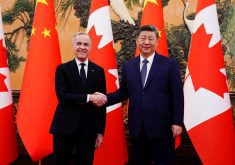To borrow and then break a line from Dickens, it was the best of timing, it was the worst of timing.
Much to the outrage of Canada’s export-minded farm groups, Bill C-202, a private member’s bill sponsored by Bloc Quebecois leader Yves-Francois Blanchet, was last month unceremoniously rammed through both the House of Commons and Senate and, last time I looked, now awaits royal assent.
Read Also

Canada’s import ban on Avix bird control system ruffles feathers
Canadian producers’ access to Bird Control Group’s Avix laser system remains blocked despite efficacy studies and certifications, as avian flu deaths rise.
C-202 is pretty much a copy-paste of the late Bill C-282, which, like many private members’ bills before it, was left to linger — in this case, at report stage before third reading in the Senate — and then die when Parliament was dissolved ahead of April’s federal election. Like its predecessor, C-202 amends section 10 of the Department of Foreign Affairs, Trade and Development Act to prohibit the federal trade minister from committing Canada to either increase its tariff rate quota for imports of foreign dairy goods, poultry or eggs or reduce Canada’s tariffs on such imports beyond any existing TRQ. In other words, Canada would be prohibited by law from granting any further concessions on its supply-managed sectors in any ongoing or future trade talks.
From the perspective of the Bloc, it was probably the best of timing. One of the foundational free trade agreements governing Canadian exports has been rendered worthless in recent months by the very politician who scribbled his name in the U.S. president’s blank. Federal officials have no doubt been taking stock of what they could throw under the bus to appease Donald Trump — a guy who has previously and specifically railed against Canada’s supply management system and in recent months has abused his executive privilege to impose and/or threaten new tariffs against goods from Canada and beyond.
From the perspective of everyone else, though, the timing couldn’t have possibly been worse. Canada’s dairy and feather sector organizations have little choice but to be pleased with C-202’s passage, but can’t have been happy about having to continue to publicly justify their system’s existence. Canada’s export-minded ag sector groups, meanwhile, protested the passage of what the Canadian Agri-Food Trade Alliance describes as a “flawed piece of legislation that sets a troubling precedent, undermining Canada’s longstanding commitment to the rules-based international trading system.”
That said, Canada’s commitment to the rules of international trade is not what’s in doubt here. As I hope I’ve implied in this space before, the problem is that the rules of the international trade game Canada is playing have proven to be only as solid as the other players’ willingness to abide by them.
For Canada to further weaken supply management under sustained international pressure for trade reform is one thing. Doing so at a time when we likely gain nothing in return — or worse, we continue to lose ground under whatever ridiculous pretext our southern neighbour comes up with next — is quite another.
The worst thing about C-202, though, is that it pitted farmer against farmer for political reasons at a time when an unwritten law of Canadian politics remains very much in effect anyway — namely, that being seen to mess with supply management is political suicide for any national party serious about forming a government.
It’s possible that unwritten law may someday change as public opinion continues to morph and evolve — and when or if that day ever comes, we can expect a repeal of the amendments now set out in C-202 to be among the first tests.
















